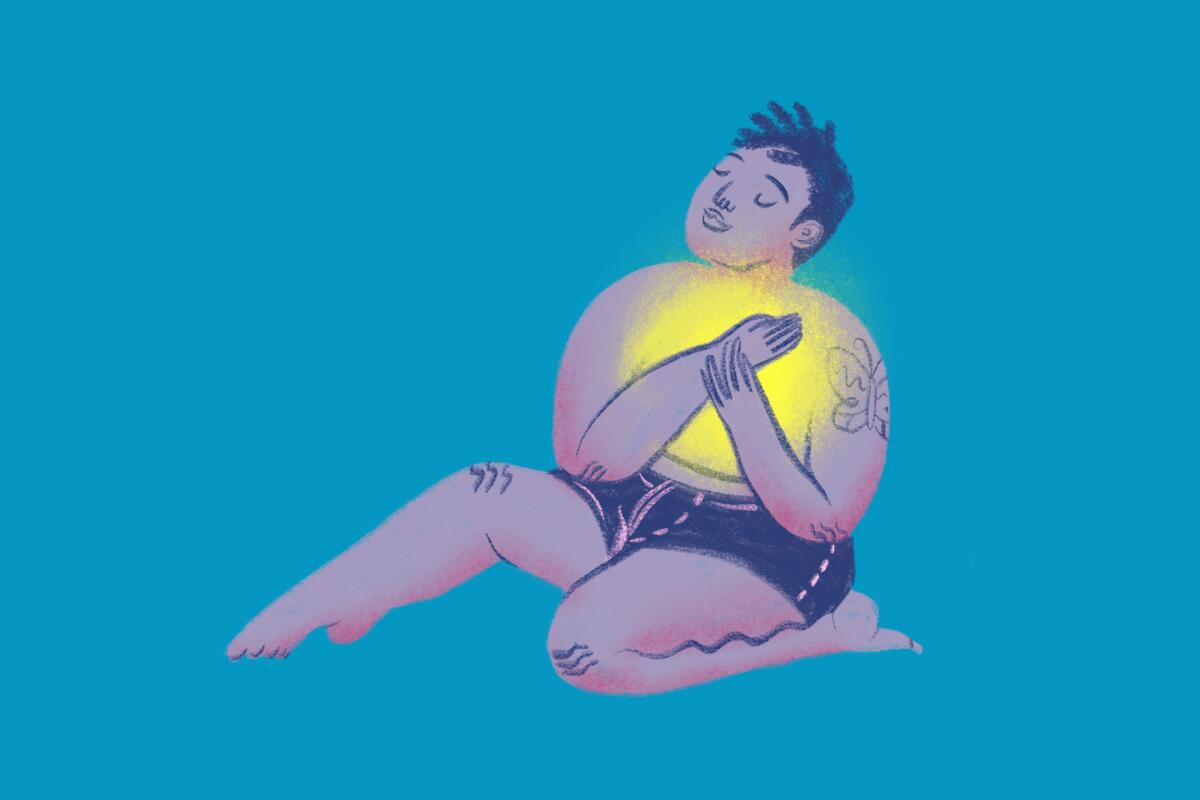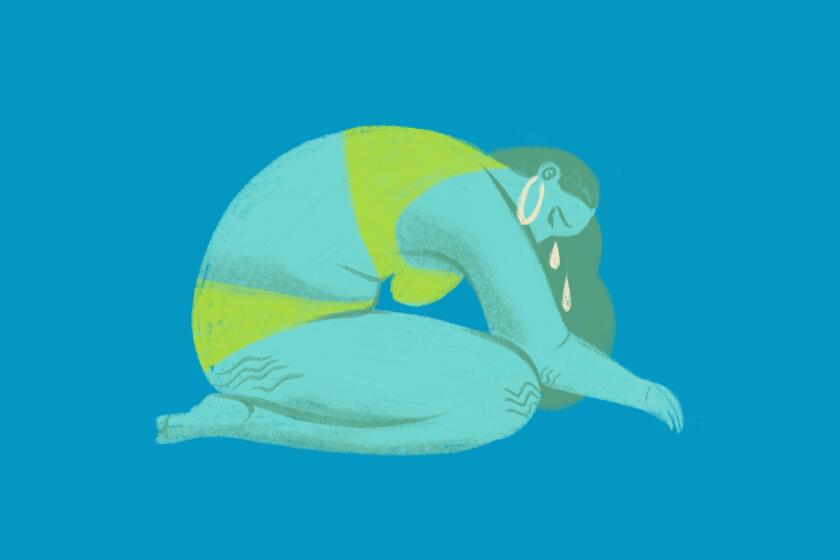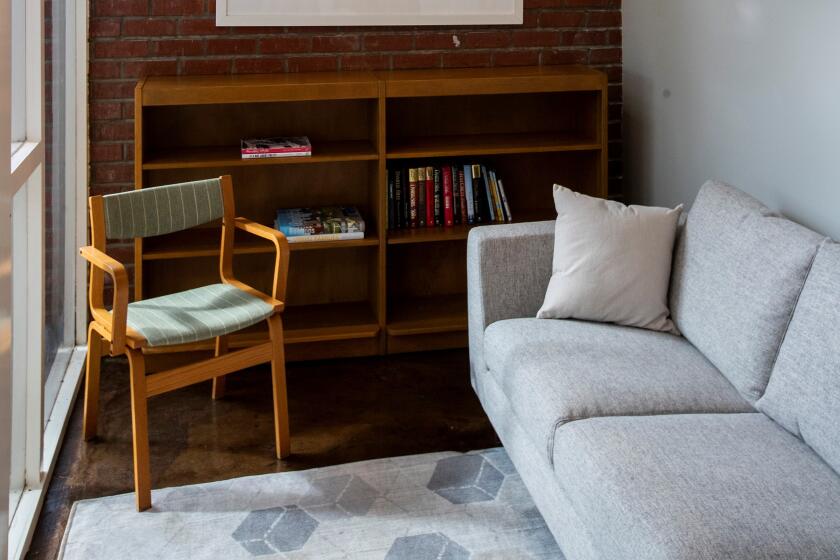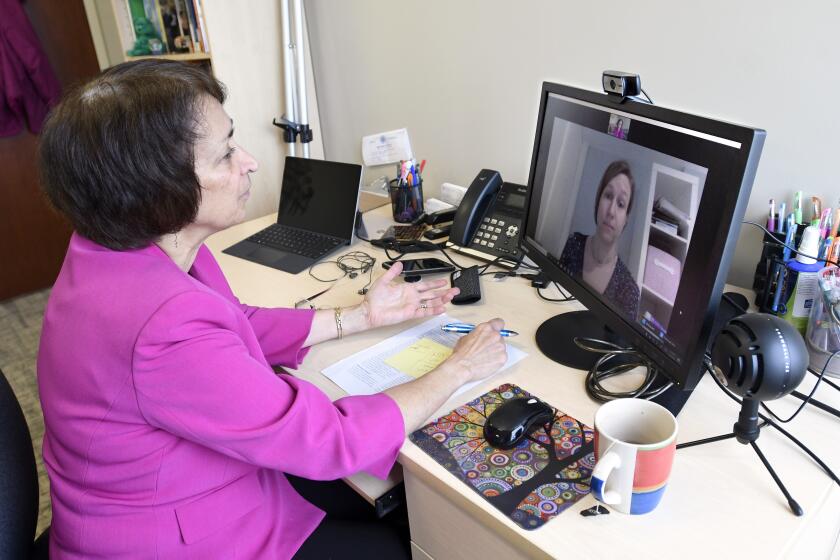If you need mental health help, reach out. Here are some resources

- Share via
With more than 23 million Californians now at least partially vaccinated against COVID-19, there seems to be light at the end of the tunnel. But the lasting effects of the coronavirus pandemic go beyond new hygiene routines and mask-wearing techniques.
The pandemic has affected nearly everyone’s mental health, said Dr. Curley Bonds, the chief medical officer for the Los Angeles County Department of Mental Health.
In October 2020, the Kaiser Family Foundation found that “41.2% of adults in California reported symptoms of anxiety and/or depressive disorder, compared to 37.7% of adults in the U.S.”
Frontline workers, caretakers and others who witnessed the immense loss of the pandemic firsthand have been deeply affected. Of those surveyed in a study by the National Institutes of Health, 42.7% of frontline nurses who worked during the pandemic reported somatic symptoms, or physical manifestations, of stress.
And around one in five people who had COVID-19 showed symptoms of anxiety and depression, Bonds said. For some, these symptoms are new, and for those who had preexisting mental health symptoms, they have been exacerbated. “Most of the studies seem to have around 20 to 30% of people will have some anxiety, depression, or sort of problems with functioning just being able to get up and do the things you normally do,” he said. That can include fatigue, lack of energy, changes in appetite or sleep, he said.
Getting closer to normal will be good, said Jonna Fries, director of counseling and psychological services at Cal State L.A., but it could still be stressful.
The coronavirus pandemic, wintertime, the daily stressors of life — it all can take a toll on our mental health. Here are some resources to help you understand therapy, how to find a therapist and more.
Anxiety associated with returning to everyday life, Bonds said, can be attributed to what he calls “cave dweller syndrome.” Imagine someone emerging from a cave and seeing light for the first time. It’s something we’re all bound to experience, venturing outdoors without a mask after months of fear and uncertainty.
These feelings of anxiety are totally normal, but you don’t have to tackle them on your own. Fries said that when it comes to your mental health: “Reach out.”
Here are some resources you can reach out to.
For a crisis or immediate help
National Suicide Prevention Lifeline: (800) 273-8255; suicidepreventionlifeline.org: Available 24 hours a day, seven days a week for those experiencing a mental health crisis. For the deaf or hard of hearing: Use your preferred relay service or dial 711 then 1 (800) 273-8255.
National Suicide Prevention Lifeline en español: 1 (888) 628-9454
National Suicide Prevention Lifeline for LGBTQ: (800) 273-8255.
Crisis Text Line: Text HOME to 741741: A trained crisis counselor is available at any time from anywhere in the United States.
CA Youth Crisis Line: (800) 843-5200; calyouth.org/cycl. This statewide emergency response system is for Californians 12 to 24. You can text, call or chat online 24 hours a day, seven days a week.
The Veterans Crisis Line and Military Crisis Line: (800) 273-8255, press 1; text 838255. If you are a veteran or know a veteran who is in crisis, this line is available 24 hours a day, seven days a week.
LA Warmline: (833) 317-HOPE (4673); www.211la.org: Anyone in Southern California who is struggling with loneliness, anxiety, substance use or other mental health concerns, or who needs information about available mental health services can call the LA Warmline between 10 p.m. and 6 a.m. and be connected with resources. You can make a call earlier and leave a voicemail. Requests for assistance submitted through voicemail usually start being addressed around 9:30 p.m. Services are available in English and Spanish. There’s also another LA Warmline available during the day time from 9 a.m. to 9 p.m.: (800) 854-7771.
OC Warmline: (714) 991-6412; www.namioc.org/oc-warmline. Provides emotional support and resources for those in need. This warmline is available to Orange County residents 24 hours a day, seven days a week. You can text or call the number to be connected with a volunteer.
It’s been a rough year, and maybe you are considering therapy for the first, second or fifth time. It takes patience and effort to find the right therapist. Here’s a breakdown of what you need to know.
Support groups and education
NAMI Urban Los Angeles (NULA): (323) 294-7814; www.namiurbanla.org. The Los Angeles branch of the National Alliance on Mental Illness helps connect Angelenos with mental health services. Different services are available depending on age group, sexual orientation and language.
Share! The Self-Help & Recovery Exchange: (310-305-8878); shareselfhelp.org. With locations in Culver City and downtown, Share hosts group sessions to address topics like anger management, depression, and substance abuse.
What is therapy and what happens in a session? What kinds are available? An introduction to a critical tool for better mental health.
For Black people
Therapy for Black Girls: therapyforblackgirls.com.
California Black Women’s Health Project: (310) 412-1828; www.cabwhp.org. The organization focuses on empowering and uplifting Black women and girls in California to become advocates for their own health and for their community’s health.
Black Emotional and Mental Health Collective: www.beam.community. BEAM connects members of the Black community, no matter their sexual orientation, gender identity or physical ability or disabilities, with resources they need to achieve mental and emotional healing.
The Safe Place: The app provides tools for the Black community to seek and receive care. It’s free and available on iOS and Android.
Manifesting M.E. Wellness: (424) 888-0447; manifestingwellness.com. Black woman owned and Los Angeles based, Manifesting M.E. Wellness provides services for marginalized communities and individuals by providing culturally competent, trauma-informed holistic mental and emotional health services.
For Native Americans
National Suicide Prevention Lifeline for Native American persons: suicidepreventionlifeline.org/nativeamericans. A resource guide for culturally specific mental health care.
Suicide Prevention: Indian Health Service: www.ihs.gov/suicideprevention. Culturally competent and specific resources for Native Americans.
Center for Native American Youth at the Aspen Institute: cnay.org. Education and resources for Native Americans ages 24 and under.
We R Native: Text “NATIVE” to 97779; wernative.org. Education and resources for Native American youths looking for mental health support and other needs.
For Latinos
Be the 1 To: Cómo y por qué pueden ayudar los cinco pasos; www.bethe1to.com. A resource in English and Spanish to help guide a conversation if you are concerned about someone being suicidal.
Therapy For Latinx: therapyforlatinx.com. A resource to connect members of the Latinx and other communities with the mental health resources they need.
For Asian Americans
Asian Mental Health Collective: asianmhc.org. Makes it easy for individuals to find mental health care professionals through their nationwide APISAA Therapist Directory.
Asian American Psychological Assn.: aapaonline.org. Provides tools to address mental health concerns, anti-bullying and Asian American LGBTQ-specific resources.
The National Asian American Pacific Islander Mental Health Assn.: www.naapimha.org. Helps connect Asian Americans, Pacific Islanders and Native Hawaiians to mental health resources.
The South Asian Mental Health Initiative & Network: samhin.org. Connects individuals with mental health care providers who specialize in offering services to the South Asian community. The provider directory allows those seeking services to choose a mental health care professional based on language, location and specialty area.
National Queer Asian Pacific Islander Alliance: www.nqapia.org. Provides comprehensive resources to LGBTQ members of the AAPI community. The healer and therapist directory centers providers of AAPI descent.
Asians Do Therapy: asiansdotherapy.com. A resource to help determine whether you need mental health care, and if so, how to find it
Cambodian Assn. of America: www.cambodianusa.com. A hub of resources to assist members of the Cambodian community.
In the U.S. and Latin America, the COVID-19 pandemic is affecting the mental health of LGBTQ young people. Experts give tips on navigating the crisis.
For LGBTQ people
Planned Parenthood: www.plannedparenthood.org/sexual-orientation. Mental and physical health resources for LGBTQ individuals are provided at most locations. Resources include a help line, gender affirming hormone therapy and teen-focused care.
The Trevor Project: (866) 488-7386; www.thetrevorproject.org. The country’s only LGBTQ youth-specific mental health hotline available 24/7.
It Gets Better Project: Hope for LGBT Youth: itgetsbetter.org. A list of resources for LGBTQ youth.
Trans Lifeline: (877) 565-8860 in the U.S., (877) 330-6366 in Canada; translifeline.org. A hotline run by transgender people providing mental health support and resources.
Tech is making mental healthcare more accessible. What you need to know about video and text therapy
Technology is making therapy more accessible, and research shows that seeking mental healthcare through video -- or even text message -- can have benefits.
Apps
Headspace. This app is free for L.A. residents, who can use it to relax, sleep or just a moment to breathe. Available on iOS and Android. To download: headspace.com/lacounty
NotOK App. This free, digital panic button can connect you with trusted contacts and mental health professionals at the press of a button. This app can help users reach out before they reach a crisis. Available on iOS and Android. To download: notokapp.com.
WIN: What I Need. Designed to connect homeless or resource-insecure people from 12 to 25, families, adults and seniors to 12 services in the L.A. area. What I Need can help users find jobs, food pantries and mental and physical health resources. Search results can be specified based on your age, gender, location and sexual orientation. Available on iOS and Android. To download: ourchildrenla.org/win-app.
Tech is making mental healthcare more accessible. What you need to know about video and text therapy
Technology is making therapy more accessible, and research shows that seeking mental healthcare through video -- or even text message -- can have benefits.
More to Read
Sign up for Essential California
The most important California stories and recommendations in your inbox every morning.
You may occasionally receive promotional content from the Los Angeles Times.

















